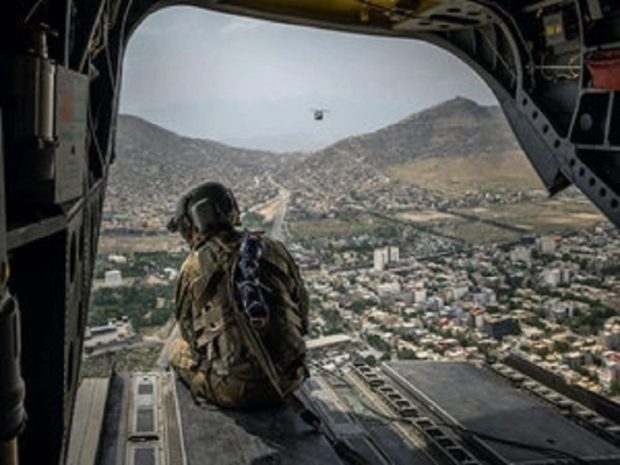
Afghan pullout has US spies reorienting in terrorism fight
PTI, Jul 3, 2021, 5:36 PM IST

Washington DC: The two-decade war in Afghanistan has given US spies a perch for keeping tabs on terrorist groups that might once again use the beleaguered nation to plan attacks against the US homeland. But that will end soon.
The withdrawal of US troops from Afghanistan is leaving intelligence agencies scrambling for other ways to monitor and stop terrorists. They’ll have to depend more on technology and their allies in the Afghan government — even as it faces an increasingly uncertain future once US and NATO forces depart.
“You may not be blind, but you’re going to be legally blind,” said Rep Mike Waltz, a Florida Republican and Green Beret who served in Afghanistan.
Waltz said in an interview that while he believed American forces would still be able to detect threats, they would have to respond with lesser intelligence and more complex operations from bases outside the country.
The Afghanistan withdrawal was ordered by President Joe Biden.
He has said it’s time to end America’s longest war after two decades of a conflict that killed 2,200 US troops and 38,000 Afghan civilians, with a cost as much as USD 1 trillion.
But that withdrawal comes with many uncertainties as a resurgent Taliban captures ground and fears mount that the country could soon fall into civil war.
The US is still working on agreements to base counterterrorism forces in the region and evacuate thousands of interpreters and other Afghans who helped the American war effort.
CIA Director William Burns testified in April that fighters from al-Qaida and the Islamic State group are still operating in Afghanistan and “remain intent on recovering the ability to attack US targets.”
“When the time comes for the US military to withdraw, the US government’s ability to collect and act on threats will diminish. That’s simply a fact,” Burns said.
He added that the CIA and other US agencies “retain a suite of capabilities” to monitor and stop threats.
Burns made a secret visit to Afghanistan in April and reassured Afghan officials that the U.S. would remain engaged in counterterrorism efforts, according to two officials familiar with the visit.
The CIA and Office of the Director of National Intelligence declined to comment for this story.
The CIA has had a role in Afghanistan for more than 30 years, dating back to aiding rebels fighting the Soviet Union from 1979 to 1989.
During the US war, it is said to have carried out strikes against terror targets and trained Afghan fighters in groups known as Counter Terrorism Pursuit Teams. Those teams are feared by many Afghans and have been implicated in extrajudicial killings of civilians.
The Associated Press reported in April that the CIA was preparing to turn over control of those teams in six provinces to the Afghan intelligence service, known as the National Directorate of Security.
The closure of posts near Afghanistan’s borders with Iran and Pakistan will make it harder to monitor hostile groups operating in those areas, and the withdrawal of Americans from Afghan agencies could worsen already troubling problems with corruption, experts said.
Washington has long struggled to gather intelligence even from its allies in Afghanistan. In the early years of the conflict, the US was drawn into rivalries that resulted in targets that were driven by score-settling among factions in the country.
Retired Lieutenant General Robert Ashley, who led the Defense Intelligence Agency from 2017 to 2020, said US authorities may be able to replace some of their lost footprints with intercepted communications as well as publicly available information posted online, particularly with the growth of cellphone networks compared with the 1990s.
And while Afghan forces have faltered against the Taliban, they can also provide valuable information, Ashley said.
“We shouldn’t discount their ability to understand their ground truth,” said Ashley, now an adjunct senior fellow at the Center for a New American Security. “It’s their nature, it’s their culture, it’s their language.”
Former intelligence officials and experts noted that the CIA and other agencies already have to work without a military presence in other countries where militant groups threaten Americans.
Udayavani is now on Telegram. Click here to join our channel and stay updated with the latest news.
Top News

Related Articles More

India & Kuwait elevate ties to strategic level; ink defence pact after PM Modi meets top Kuwaiti leaders

In Kuwait, PM Modi meets yoga practitioner, other influencers from Gulf country

PM Modi receives Kuwait’s highest honour

PM Modi in Kuwait meets translator, publisher of Mahabharata, Ramayana in Arabic

Indian manpower, skills will help build ‘New Kuwait’: PM Modi
MUST WATCH
Latest Additions

Kannada Sahitya Sammelana: Food distribution creates stir

Rohit gets hit in nets, practice pitches on slower side

India & Kuwait elevate ties to strategic level; ink defence pact after PM Modi meets top Kuwaiti leaders

In Kuwait, PM Modi meets yoga practitioner, other influencers from Gulf country

Notorious gangster wanted in UAPA case arrested at Nepal border
Thanks for visiting Udayavani
You seem to have an Ad Blocker on.
To continue reading, please turn it off or whitelist Udayavani.

















